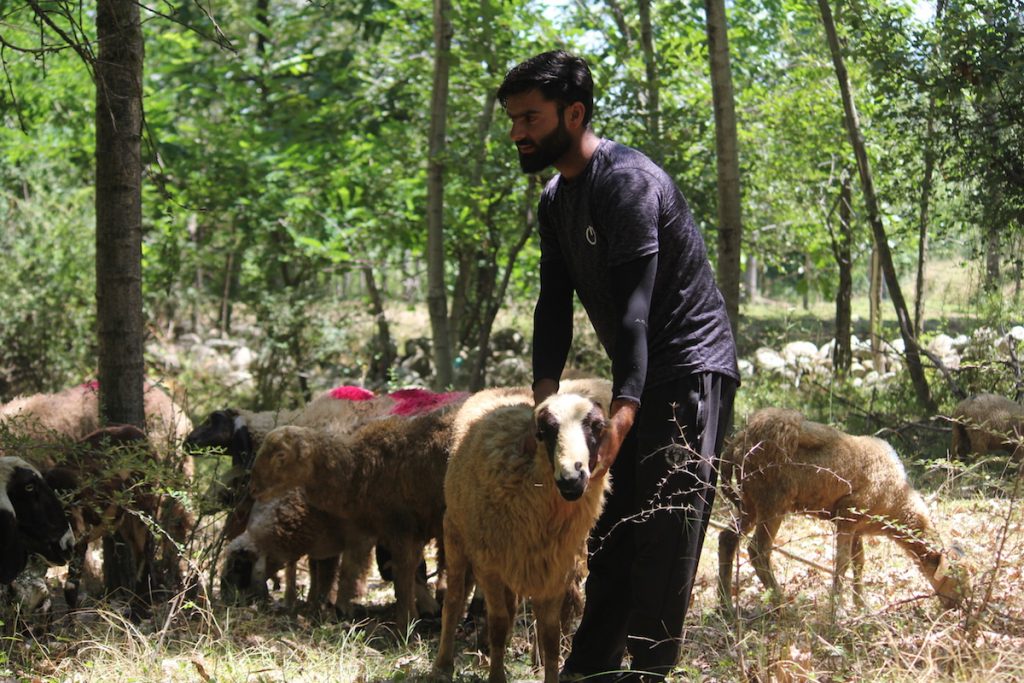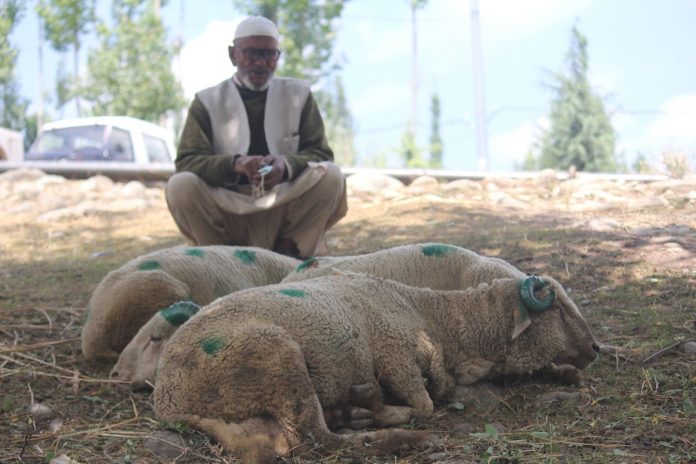Adil Ahmad Rather wanted a decent price for his livestock during the upcoming Muslim festival of Eid but the effects of the pandemic in India is making this look unattainable.
The 23-year-old farmer from the Pulwama area of south Kashmir took a herd of his sheep towards Srinagar, the summer capital of the Indian territory.
It was a three-day effort herding his sheep, often navigating barricades placed in the middle of roads to thwart passage of public and private transport, but he and his animals reached the city’s main market.
However, no one was there to buy his livestock.
“This has never happened before. Several days have passed and not many people are interested in buying animals for the Eid sacrifice. I fear I may have to return with empty pockets,” Rather said.
His predicament is shared by Amanullah Khan, a livestock farmer from India’s northern state of Uttar Pradesh.
Last week Khan walked for two days to sell his herd of male goats in India’s capital New Delhi. The 57-year-old was turned back by police near Delhi’s border.
“The police told me I could be arrested if I defied the orders. I was informed that no sale of livestock this year has been allowed in Delhi due to the ongoing pandemic,” Khan told LiCAS.news
A market for the sale of sacrificial animals for Eid is usually held in old city near the grand mosque or Jamia masjid area but it has now been closed due to COVID-19. Livestock producers from neighboring states would typically come in large numbers to sell their animals there.
“I had hoped I’d make some profit from the herd this year, but it seems that the festivity of this sacred Muslim festival is gone and might not return for years to come,” Khan said.
Arshad Qureshi, president of the Delhi Meat Merchant Association, said the restrictions imposed by the government on the sale and purchase of sacrificial animals this year has caused hardships to those who rely on the trade and for those celebrating Eid-ul-Azha.
Sheep and goat farming are a primary source of income for scores of farmers in India who sell a large amount of their animals for the festival of Eid. Both Muslim and non-Muslim cattle farmers also sell their animals in the markets to Muslims for the festivals.

‘Not merely a ritual or a custom’
Several Muslim organizations in India have urged the government to lift the curbs on the sale of animals in open markets.
Jamaat-e-Islami Hind a prominent organization of Indian Muslims has come out with a fatwa or a decree, stating that sacrifice of an animal on Eid is obligatory and shouldn’t be avoided.
“’Qurbani’ [animal sacrifice] is not merely a ritual or a custom. It is stated in a ‘Hadith’ [saying of the Prophet] that on the days of sacrifice, Qurbani is the most cherished deed in the eyes of Allah. Hence, as far as possible, Muslims must try and offer Qurbani on the occasion of Eid-al-Adha. Charity [‘Sadaqah-Khairat’] or some social service cannot be a replacement for this deed of Qurbani,” the organization said in a statement last week.
Eid-ul- Adha — also known as Bakr Eid in India — is celebrated worldwide on the 10th day of Dhu al-Hijjah; the twelfth and final month in the Islamic calendar. This year, it is celebrated on Aug. 1. It honors the willingness of Prophet Abraham to sacrifice his son as an act of obedience to the will of God. Moments before Abraham sacrificed his son, God provided a male goat to sacrifice instead. Mostly Muslims slaughter sheep, goat or male cattle on the occasion.
Dr Suhail Naik, who is head of the Doctors Association in Kashmir, said there is no harm in sacrificing animals on Eid-al-Adha if standard operating procedures mindful of COVID-19 are followed.
Naik said the government must ensure availability of sacrificial animals at genuine rates at Mohalla and Colony levels, so that people can purchase them near their residences without any overcrowding.
“There is no scientific evidence that suggests that the sacrifice of animals will in any way be harmful if protocols and advises are properly followed. I advise people to wear masks and maintain physical and social distancing while purchasing sacrificial animals,” Naik said.
However, there has been some reluctance by some Muslims to buying animals for sacrifice this year.
Suhail Javaid, a government employee based in New Delhi, told LiCAS.news that this is going to be the first time when he wouldn’t be able to offer any sacrifice due to the pandemic.
As per the Muslim practice the meat of the sacrificial animals is divided into three parts. One is distributed amongst the relatives, another in the neighborhood and the remaining part is consumed by the family itself.
“It is dangerous to enter somebody’s home. We don’t know who is carrying the virus and who is not. Why to endanger life by distributing sacred meat?” Javaid said.
Muslims — who constitute India’s 14 percent of the 1.3 billion population — have been asked by the government to avoid congregational prayers and avoid as much as possible the ritual of sacrificing animals.
As of July 27, India has reported more than 1.38 million COVID-19 cases. More than 32,000 people have been killed by the disease in the country which has been subjected to a nationwide lockdown since late March.









